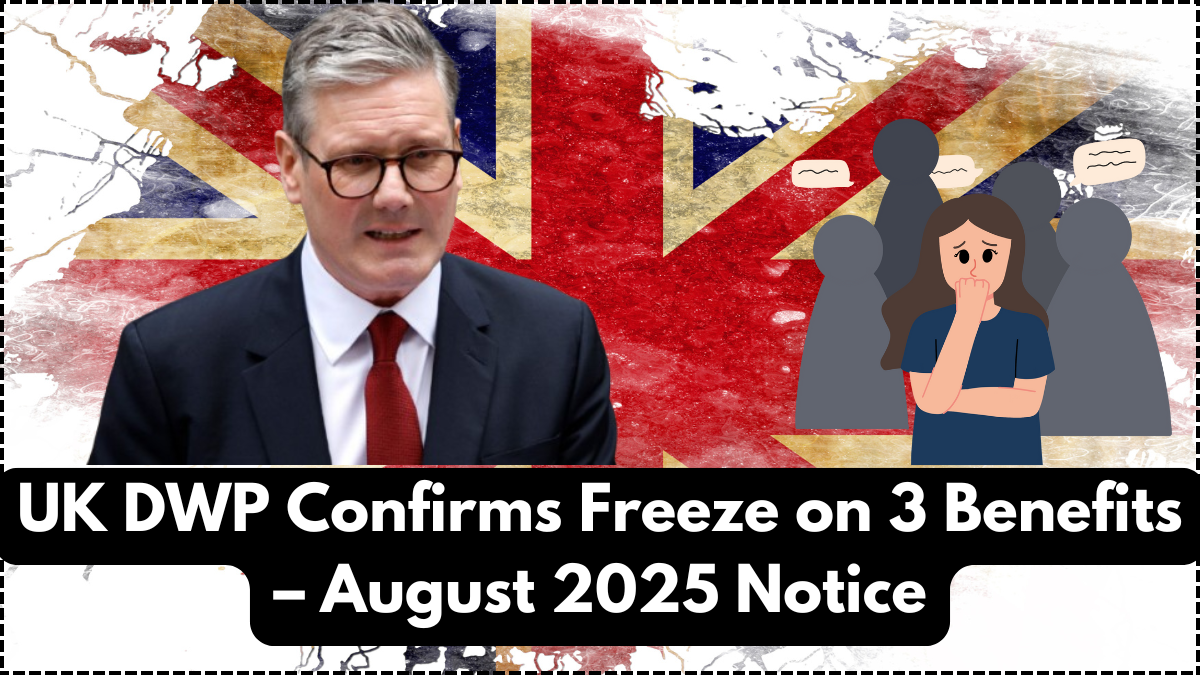The Department for Work and Pensions (DWP) has confirmed a DWP benefit freeze for three major benefits in its August 2025 notice, raising concerns for millions of claimants. The decision means that payments for certain support programs will remain at their current levels despite rising living costs across the country.
Many households depend on these benefits for essential expenses like food, utilities, and rent. With no increase planned, the announcement has sparked conversations about how this will affect daily life and how the government plans to address the growing UK inflation impact on low-income families.

Why the DWP benefit freeze is Significant
The DWP benefit freeze comes at a time when inflation remains a major issue for the UK economy. Prices for everyday goods and services have been steadily rising, putting extra pressure on people who rely on benefits.
The government’s decision to keep these benefits at the same level has drawn mixed reactions. Some see it as a necessary step for economic stability, while others worry it will make life harder for vulnerable groups already dealing with the UK inflation impact.
Which Benefits are Affected by the Freeze
The DWP outlined exactly which programs are part of the DWP benefit freeze, giving claimants a clear understanding of what to expect.
| Benefit Program | Status for 2025 | Notes |
|---|---|---|
| Jobseeker’s Allowance | Frozen | No rate increase |
| Housing Benefit | Frozen | Rates remain unchanged |
| Income Support | Frozen | Payment levels fixed |
This table shows the specific benefits impacted by the freeze and helps illustrate why the UK inflation impact could hit those depending on these payments the hardest.
How the DWP benefit freeze Affects Households
For many, the DWP benefit freeze means their income will effectively shrink as living costs climb. Food prices, energy bills, and housing costs are all subject to the UK inflation impact, which reduces the purchasing power of fixed payments.
Families and individuals relying on frozen benefits may need to adjust their budgets, seek additional income sources, or turn to local councils and charities for support. This situation underlines how closely benefit policies and inflation are connected.
Government Response and Public Reaction
The government has stated that the DWP benefit freeze is a temporary measure meant to control public spending while tackling broader economic challenges. However, critics argue that freezing benefits during high inflation disproportionately affects the most vulnerable citizens.
As debates continue in Parliament, many advocacy groups are calling for adjustments or compensatory measures to offset the UK inflation impact and protect households from deeper financial strain.
Conclusion
The DWP benefit freeze has sparked widespread debate as households brace for tighter budgets in the face of ongoing economic challenges. By holding payment rates steady while costs rise, the freeze highlights the harsh reality of the UK inflation impact on vulnerable citizens. The coming months will show whether further government action is taken to soften the blow or if claimants will have to manage with unchanged benefits through 2025.
FAQs
What is the DWP benefit freeze for 2025?
It is a policy decision to keep certain benefit payments at current levels without increases for this year.
Which benefits are affected by the freeze?
The freeze applies to Jobseeker’s Allowance, Housing Benefit, and Income Support.
How does the DWP benefit freeze relate to inflation?
The freeze means payments won’t rise to match the UK inflation impact, which reduces their real value over time.
Will other benefits like Universal Credit be frozen too?
The August notice specifies only three programs, and Universal Credit is not currently listed.
Can the decision be reversed later in the year?
While unlikely in the short term, the government may review the DWP benefit freeze if economic conditions change.
Click here to learn more